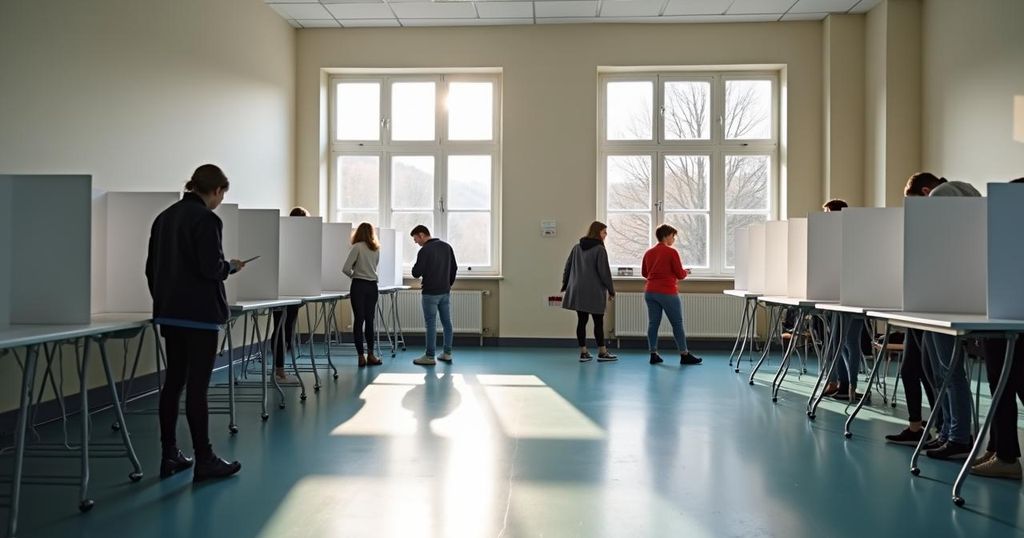Lithuania Elections: Center-Left Coalition Poised for Change as Polls Open

Lithuanians voted in the first round of general elections, where the ruling center-right Homeland Union may be succeeded by a center-left coalition led by the Social Democrats. Approximately 2.4 million voters participated, and new alliances are anticipated due to no party reaching 20% support. Prime Minister Simonyte’s government faced declining popularity over various issues including its handling of the COVID-19 pandemic and migration policies. However, the political landscape remains largely cautious as both right- and left-leaning parties agree on several core issues.
Lithuanians have cast their votes in the preliminary round of general elections, with predictions indicating a potential shift in governance from the ruling center-right Homeland Union to an opposition coalition featuring the center-left Social Democrats alongside smaller parties. Approximately 2.4 million citizens are registered to vote in this electoral exercise, which will culminate in the election of 141 representatives for a four-year tenure. Should no candidate secure over 50% of the votes in their district, a runoff election is scheduled for October 27 between the top two candidates. Recent polling data from Vilmorus indicates that the Social Democrats may receive double the support of the Homeland Union. However, a fragmented voting landscape is anticipated, as no single party is expected to achieve more than 20% of the overall vote, necessitating alliances to form a government. Prime Minister Ingrida Simonyte’s administration has experienced a notable decline in public favor, attributed to various crises that have overshadowed economic achievements such as growth and low inflation rates. Political analyst Rima Urbonaite from Mykolas Romeris University remarked, “There is a lot of disappointment and discontent among voters. It is related to numerous crises and shocks and cannot be compensated by economic factors like positive change in purchasing power.” Grievances have been raised regarding the government’s stringent measures during the COVID-19 pandemic, insufficient support for businesses during periods of lockdown, and inadequate healthcare services. Additionally, the government’s management of an influx of migrants from Belarus has garnered criticism, further complicating the administration’s standing. The Social Democrats have pledged to tackle income inequality through the introduction of taxes on the affluent and the establishment of welfare programs. Furthermore, President Gitanas Nauseda, who secured re-election in May, is perceived as favoring a potential change in the political landscape. In a contrasting narrative, the emergence of a new populist party, Nemunas Dawn, led by the controversial Remigijus Zemaitaitis, has stirred discord. Zemaitaitis previously resigned his parliamentary seat following backlash over antisemitic remarks and currently faces trial for incitement to hatred. Most political factions have publicly declared their unwillingness to ally with him. Analysts suggest that even if a shift in government occurs, significant policy alterations are improbable, given that both right- and left-leaning parties concur on critical issues such as support for Ukraine and the necessity to enhance military expenditure in light of regional security concerns involving Russia.
The context of this election reflects a broader dissatisfaction among voters with the current government’s performance, particularly regarding crisis management and socioeconomic disparities. The election is pivotal as it could lead to the formation of a new government that promises to address issues of income inequality and public welfare. With Lithuania’s strategic position as a member of the European Union and NATO, the political landscape is also influenced by regional security dynamics, particularly in relation to Russia’s increased assertiveness in Eastern Europe. The political environment is shaped by public sentiment towards previous government actions and the rising influence of populist sentiments, despite significant opposition from established political entities.
The ongoing general elections in Lithuania herald the possibility of significant political realignment, with the Social Democrats poised to lead a coalition against the ruling Homeland Union. Voter dissatisfaction stemming from various governance failures may lead to a new administration committed to rectifying income inequality and enhancing welfare. However, continuity in certain policy areas is likely, given the shared perspectives among leading political parties on fundamental issues such as military readiness and support for Ukraine. As the electoral process unfolds, the necessity for strategic alliances becomes increasingly apparent in achieving a stable governmental framework.
Original Source: www.dw.com








